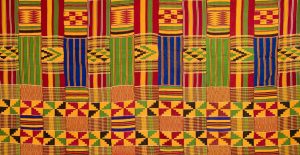
Ghana, often referred to as the “Gateway to Africa,” is a country that boasts a diverse and rich cultural heritage, breathtaking landscapes, and a multitude of unique offerings.
From its colonial history to vibrant traditions and bustling markets, Ghana has captured the hearts of both locals and visitors alike. In this article, we will delve into the various aspects that make Ghana famous and a must-visit destination.
Nestled on the West African coast, Ghana stands as a shining gem that has captivated the world with its rich cultural tapestry, stunning landscapes, and unparalleled warmth. When it comes to cultural diversity and influence, much like New Jersey, Ghana has its share of Famous Faces from NJ who have left an indelible mark on the global stage.
These individuals from both regions have contributed significantly to their respective communities, making them known and celebrated worldwide. To learn more about what New Jersey is known for and its famous personalities, check out the page “Famous Faces from NJ” on TalesofTravelers.com.
When it comes to the question, “What is Ghana famous for?” the answer unfolds in a kaleidoscope of experiences that beckon travelers and culture enthusiasts alike.
From its historical significance as the “Gateway to Africa” to its vibrant traditions and unique offerings, Ghana has woven a narrative that echoes through time.
Ghana’s reputation as the “Gateway to Africa” is more than a mere moniker; it embodies the country’s role as an entry point to the continent’s beauty and diversity.
As you step onto Ghanaian soil, the genuine warmth and hospitality of its people embrace you, creating an instant connection that goes beyond borders.
Contents
Gateway to Africa
Ghana serves as a welcoming entry point to the African continent. Its warm and hospitable people instantly make visitors feel at home. The country’s open arms have earned it the nickname “Gateway to Africa,” offering a taste of the genuine friendliness and vibrant culture that Africa is known for. If you’re interested in exploring diverse heritages beyond Africa, you might also want to learn about Virginia’s Diverse Heritage, which has its own unique stories and cultural richness.
Ghana, affectionately known as the “Gateway to Africa,” extends a heartfelt invitation to the world to explore the enchanting wonders of the African continent.
Situated on the picturesque West African coast, Ghana’s reputation as a welcoming entry point is not only geographical but also cultural.
As you set foot on Ghanaian soil, you’re greeted by a sense of belonging and camaraderie that transcends borders. This warm embrace, deeply ingrained in the nation’s ethos, signifies more than a mere geographical entry—it signifies an introduction to the rich cultural tapestry, historical significance, and vibrant traditions that define Ghana. Join us as we journey through the pages of this article to unveil the captivating story of Ghana, the Gateway to Africa.
Colonial Heritage

Ghana’s history is deeply intertwined with its colonial past, and the remnants of this era can still be seen in the architecture and landmarks that grace its cities. The colonial influence has left a lasting mark on the culture and society of Ghana, creating a unique blend of tradition and modernity. To explore more about Ocean City’s claim to fame and its cultural significance, visit our page on Ocean City’s Claim to Fame.
Ghana’s allure reaches beyond its enchanting landscapes; it’s a nation with a profound story etched into its very foundations.
At the heart of this narrative lies its colonial heritage, a chapter that has left an indelible mark on the nation’s culture, architecture, and identity. Ghana’s colonial past, as a former British colony known as the Gold Coast, stands as a testament to its resilience and transformation.
The echoes of this era resound through the architecture that graces the cities, serving as a visual reminder of a time when colonial powers left their imprint on foreign lands.
The fusion of colonial and indigenous styles creates a unique aesthetic that is both nostalgic and forward-looking. Beyond the façades, this heritage has woven itself into the fabric of Ghanaian society, shaping traditions, language, and even the nation’s approach to modernity.
Chale
In Ghanaian fashion, particularly the iconic “chale” or headwrap, is a symbol of national pride. The vibrant fabrics and intricate designs of chale reflect the country’s rich cultural diversity and creativity. Amidst the vibrant tapestry of Ghana’s cultural heritage, one element stands out as a symbol of both tradition and fashion-forward creativity: the “chale.” Explore more about the essence of Brighton in Ghanaian fashion, and how it mirrors the cultural pride, on the page “The Essence of Brighton.”
This iconic headwrap has not only adorned the heads of Ghanaian women for generations but has also transcended its roots to become a statement of national pride and style.
The chale is more than just a piece of fabric; it’s a testament to the intricate artistry and rich cultural significance that define Ghana’s fashion landscape.
In this exploration of “Chale,” we delve into the origins, meanings, and contemporary interpretations of this timeless Ghanaian fashion accessory, tracing its journey from tradition to trendsetter.
Ghanaian Cuisine

No exploration of Ghana is complete without indulging in its flavorful cuisine. From the beloved jollof rice to the delectable fufu paired with assorted soups, Ghanaian dishes are a treat for the taste buds. The use of local ingredients and traditional cooking methods adds a unique twist to every meal.
Ghana, a captivating West African nation, boasts a rich tapestry of history, culture, and natural beauty that has earned it global recognition.
Renowned for its hospitable people and vibrant traditions, Ghana stands as a beacon of African heritage. The nation’s historical significance as a pivotal point in the transatlantic slave trade is etched into its coastal forts and castles, drawing visitors seeking to understand this poignant chapter.
Furthermore, Ghana’s diverse landscapes, from the lush rainforests of Kakum National Park to the arid expanses of Mole National Park, showcase its ecological splendor.
This nation is celebrated for its pivotal role in Pan-Africanism, with Accra hosting the monumental Kwame Nkrumah Mausoleum.
From its renowned Kente cloth to its rhythmic highlife music, Ghana’s cultural contributions resonate far beyond its borders, making it a cherished gem in Africa’s crown of distinction.
Large Lebanese Community
Ghana is home to a sizable Lebanese community that has seamlessly integrated into the country’s social fabric. This fusion of cultures is evident in various aspects of daily life, from business to cuisine, creating a harmonious blend of traditions.
The expansive Lebanese community stands as a vibrant tapestry woven into the fabric of various nations across the globe.
Known for their rich cultural heritage, resilient spirit, and far-reaching influence, Lebanese expatriates have fostered a profound sense of identity and unity within their diaspora.
With a history steeped in both ancient traditions and modern accomplishments, this community has contributed significantly to fields such as business, arts, academia, and cuisine.
From the bustling streets of São Paulo to the cosmopolitan hubs of Paris and New York, the Lebanese presence is felt keenly.
As this diaspora continues to flourish, it exemplifies the power of human connectivity and the enduring impact of a culture that transcends borders.
Trotros
Trotros, brightly painted shared minivans, are the lifeblood of Ghana’s transportation system. These vehicles not only offer a convenient way to navigate the bustling streets but also provide an authentic experience of local life and camaraderie.
Trotros, a quintessential mode of transport in many West African cities, encapsulate the vibrant essence of local life and culture. These minibus-like vehicles, adorned with an array of colorful paintings and slogans, navigate bustling streets with an energy that mirrors the cities they serve.
Originating in Ghana but widely adopted across the region, trotros are more than mere conveyances; they are dynamic microcosms of the communities they traverse.
From their distinct artwork that mirrors societal values to the convivial interactions among passengers, trotros provide an intimate window into the daily rhythms of urban existence.
This introduction delves into the captivating world of trotros, exploring their historical significance, cultural resonance, and role as an emblem of shared experiences in the heart of West Africa’s urban landscapes.
Cocoa

Ghana is one of the world’s largest producers of cocoa, often referred to as the “Gold Coast.” The cocoa industry plays a significant role in the country’s economy, making it an essential part of its identity. Cocoa, derived from the cacao bean, stands as a cornerstone of culinary and cultural significance worldwide.
Revered for centuries, this versatile ingredient has evolved beyond its ancient roots to become a vital component in contemporary gastronomy and trade.
With its origins traced back to Mesoamerican civilizations, cocoa’s journey spans through time, bridging cultures and civilizations.
Renowned for its role in producing the beloved confection, chocolate, cocoa also boasts a range of applications, from beverages to skincare.
This intricate tale encapsulates the allure of cocoa, interweaving history, indulgence, and innovation. As global appreciation for diverse flavors and sustainable practices grows, cocoa remains at the crossroads of tradition and modernity, a testament to humanity’s enduring fascination with this enchanting bean.
Novelty Coffins
Ghana’s tradition of crafting elaborate, thematic coffins is a truly distinctive practice. These coffins are designed to reflect the interests and passions of the deceased, celebrating their life in a creative and artistic manner.
Introducing the intriguing realm of “Novelty Coffins” – an unconventional twist on traditional funeral practices. In the solemnity of farewells, these unique coffins emerge as a testament to personal identity and a celebration of life’s diversity.
Departing from the conventional somberness, Novelty Coffins encapsulate individual passions, hobbies, and quirks, crafting a more personalized narrative for the departed.
From artistic creations resembling beloved objects to thematic designs mirroring a life’s journey, these coffins reflect the uniqueness of each person’s story.
As a departure from the ordinary, they offer a profound way to honor the departed while sparking conversations about life, legacy, and the very nature of mortality. This exploration delves into the intriguing world of Novelty Coffins, where the boundary between tradition and innovation gracefully blurs.
Kente

Kente cloth is a traditional fabric that holds immense cultural significance. Woven with intricate patterns and vibrant colors, Kente is often worn on special occasions and ceremonies, symbolizing heritage and unity.
Kente, an intricate and vibrant woven fabric, stands as an emblem of Ghanaian culture and history. Renowned for its intricate patterns and kaleidoscope of colors, Kente is more than just a textile; it’s a symbol of Ghana’s rich heritage and artistic prowess.
Originating from the Ashanti Kingdom, Kente has transcended its local origins to become a globally recognized emblem of African identity.
The weaving process itself is a testament to the skilled craftsmanship passed down through generations, with each pattern and color combination often holding specific meanings.
As a form of visual storytelling, Kente encapsulates tales of bravery, social status, and communal unity. In this exploration, we delve into the origins, significance, and enduring legacy of Kente, discovering how this art form continues to weave the threads of tradition and modernity.
Kejetia Market
The bustling Kejetia Market is a vibrant hub of trade and commerce. From fresh produce to handmade crafts, this market offers a sensory overload of sights, sounds, and scents, making it an unforgettable shopping experience.
The bustling heart of Kumasi, Ghana, is adorned with the vibrant tapestry of Kejetia Market. A microcosm of life, this sprawling marketplace stands as a testament to the nation’s rich heritage and dynamic economy.
Navigating its labyrinthine alleys and corridors, one is engulfed in a sensory symphony – the aroma of exotic spices, the kaleidoscope of colorful textiles, and the rhythmic cadence of bargaining voices.
For decades, Kejetia has been more than a marketplace; it’s a cultural crossroads where stories are exchanged as readily as goods.
Its history intertwines with Ghana’s evolution, from a trade hub to a modern metropolis. In this hub of commerce and community, tradition meets innovation, offering a glimpse into the soul of Kumasi and the essence of Ghana itself.
Spot Bars
Ghana’s spot bars are where locals gather to unwind and socialize after a long day. These lively establishments offer a taste of the country’s nightlife, with music, dancing, and camaraderie taking center stage.
“Spot Bars” stands as a beacon of leisure and social delight, offering a distinctive blend of relaxation and entertainment that captivates visitors from all walks of life.
Nestled in the heart of urban allure, our establishment redefines the concept of socializing by merging exquisite culinary craftsmanship with an inviting ambiance.
As daylight gives way to twilight, the venue transforms, with soft lighting and harmonious melodies enveloping the surroundings.
Whether one seeks a tranquil corner to savor handcrafted cocktails, desires a culinary journey through an eclectic menu, or craves the energy of live performances, Spot Bars delivers an experience that transcends mere recreation.
With its fusion of sensory pleasures, attentive service, and an atmosphere that seamlessly balances intimacy and vibrancy, Spot Bars paves the way for unforgettable moments and the forging of enduring connections.
Azonto
Azonto, a popular dance style, embodies the spirit of celebration and joy. With its energetic and rhythmic movements, Azonto has become a symbol of Ghanaian pride and unity.
Azonto is a vibrant and infectious Ghanaian dance and music genre that has captured the hearts of people worldwide. Originating in the early 2010s, Azonto emerged as a cultural phenomenon, fusing traditional African rhythms with modern beats.
The dance style is characterized by its intricate footwork, rapid waist movements, and playful gestures, all of which sync with the rhythm of the music.
Azonto serves as more than just a dance; it’s a form of expression, storytelling, and social commentary, often reflecting daily life, humor, and current events.
This genre’s global popularity has led to its integration into various music genres and mainstream media. With its lively energy and cross-cultural appeal, Azonto continues to transcend borders, connecting people through rhythm and movement.
Wrap Up
Ghana’s fame rests on its rich heritage, cultural diversity, and vibrant traditions. From its colonial history to its modern rhythms, the country offers a multifaceted experience that leaves a lasting impression on all who visit.
“Concluding our comprehensive exploration, this wrap-up serves as a synthesis of the multifaceted concepts and insights we’ve delved into. Throughout our journey, we’ve traversed intricate landscapes of knowledge, uncovering a tapestry woven with threads of wisdom from various domains.
From the complexities of technological innovation to the nuances of sociocultural evolution, each facet we’ve examined has contributed to a deeper understanding of our ever-changing world.
As we gather these threads of thought, we are reminded of the interconnectedness that underlies human progress. This synthesis not only encapsulates our intellectual voyage but also beckons further curiosity, inviting us to embark on new expeditions of learning.
With enriched perspectives and newfound appreciation, let us embrace the challenges and opportunities that lie ahead, armed with the insights gained from this odyssey of exploration.”
Conclusion
In conclusion, Ghana’s fame is etched upon a rich tapestry woven with historical significance, cultural vibrancy, and natural splendor. This West African nation stands proud as the birthplace of pan-Africanism, where the echoes of its fight for independence resonate across the continent.
It is renowned for its hospitable people, who embrace visitors with warmth and enthusiasm, creating an inviting atmosphere. Ghana’s cultural heritage, exemplified by festivals like the vibrant Ashanti Durbar, kente cloth weaving, and captivating drumming rhythms, adds a vibrant brushstroke to its fame.
Moreover, Ghana’s diverse landscapes, from the lush rainforests of Kakum National Park to the haunting beauty of Cape Coast Castle, captivate the hearts of adventurers and history enthusiasts alike. Its gold-laden history, symbolized by the iconic Asante golden stool, further cements Ghana’s place on the global stage.

